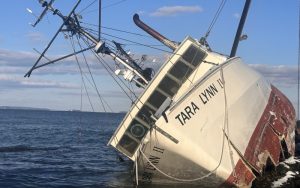By Carli Stewart, National Fisherman, January 21, 2024

The Tara Lynn II ran aground early Saturday morning during the second storm that hit the Maine coast this past week. David Osier, owner of the vessel and Osier Seafood in South Bristol, says that one of the crew members fell asleep after turning on the autopilot.
According to Osier, there was a bridge alarm installed onboard the Tara Lynn II to keep the crew alert and ensure that whoever was on watch would not fall asleep. From what they can tell, the alarm wasn’t turned on. “Supposedly the crew member piloting the ship fell asleep at the wheel and then just went straight into the beach,” Osier told local media.
“Operator error is the cause of this accident.”
The four people aboard the 50-foot vessel were not injured and were rescued by skiff via the Wet Team of the Cape Elizabeth Fire Department shortly after the Mayday call went out to the U.S. Coast Guard at 12:30 a.m. There was a NOAA Fisheries observer aboard in addition to the crew and captain.
This vessel is one of the four boats in the commercial fishing fleet owned by Osier Seafood and was on its way into port within Portland Harbor after a groundfish trip. The Tara Lynn was only moving at four knots when it struck the beach; the damage was minimal when it initially ran aground. However, the storm made it impossible to tow the boat off the beach at high tide later that day, creating significant damage to the boat’s hull.
Approximately 500 gallons of fuel were discharged, as well as nearly 5,000 pounds of fish from the Tara Lynn II. The insurance company for the boat hired Determination Marine, owned by Parker Poole of Portland, ME, to clean up the wreck. Maine Department of Environmental Protection and the U.S. Coast Guard have been working with Poole to ensure there is no lasting damage.
After days of working with private property landowners and the Cape Elizabeth Land Trust, Poole and a crew were able to start picking up the debris scattered across Trundy Point.
Poole was in preparation mode for the second oncoming storm that week changing fuel filters on his boat New Ledge when the Mayday call came through, “I heard the radio a little past midnight, and was underway within 10 minutes.” Poole shared.
“I was first on the scene of the wreck, but with the winds already picking up, there was no way to get alongside the vessel. The Cape Elizabeth Wet Team did an amazing job getting the crew safely off the boat.”
Throughout the storm, the 45-knot winds and six-foot waves battered the vessel and ran it further up the beach and into the rocks. Poole drafted a full salvage plan for the vessel, which was then reviewed and approved by everyone involved before work could begin.
“Thanks to Scott Dugas Trucking & Excavating, and Material Handling Sales both out of Yarmouth, ME, the vessel should be cleaned up by mid-next week, and the affected property should be in better condition than before.” Poole shared.
“At the end of the day, we are lucky that no one got hurt, and there was a minimal impact on the environment.”
The Tara Lynn II hasn’t been the only incident along the Maine coast, and many fishing communities are struggling to pick up pieces of gear and further damage done from back-to-back storms. Maine Coast Fishermen’s Association and the Island Institute have further information on resources to report damages as well as grant programs to offer urgent financial relief. You can donate here.
“It’s been a busy couple of weeks with back-to-back storms within three days of each other. The Maine coast took it hard, and the community will be busy repairing the coastal infrastructure one project at a time.” Poole mentioned.